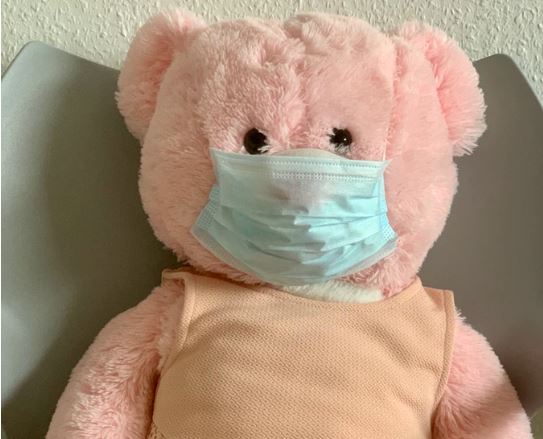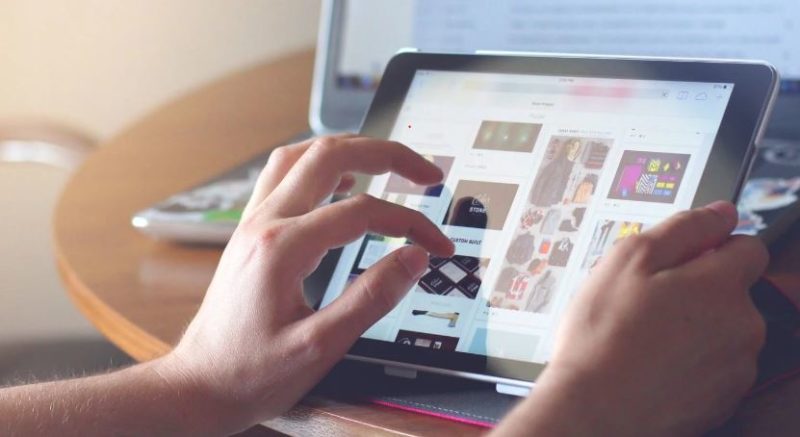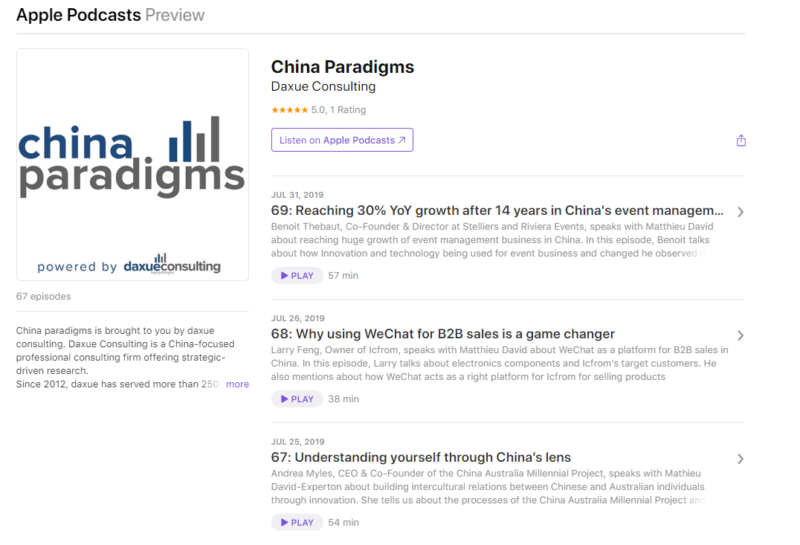We asked entrepreneurs in China how they coped with the Coronavirus outbreak
Our research on crisis management in China has already suggested the most important strategies to ensure business continuity include; embracing social responsibility, adopting technology, caring for employees, and adapting your purpose to new market demands. However to take our research one step further, we asked some outstanding China entrepreneurs from our China business podcast, China Paradigms about their experience of management during the Coronavirus in China. This is what they have to share with the rest of the world.
Think before you leap: Make a hypothesis before taking action

Hypothesis before action
Geoffrey Handley, co-founder and general partner of Haitao Capital recommends bracing your business with a worst case scenario hypothesis. This way, entrepreneurs can make principle-based business decisions rather than blindly rushing into changing X or stopping Y. Chinese founders started with a big scary base hypothesis and set of assumptions. One possible hypothesis would be, “we will have a 100% hit to our revenue for at least 3 months, then 80% for 2nd quarter. Will take us 3 quarters to get back to where we are now”. Once this hypothesis has been taken into account, then businesses can take steps on management during the Coronavirus.
No sacred cows, nothing is off limits.
When working through hypothesis scenario planning, it was evident that nothing was off limits. The guiding principle I could see in action from our portfolio co-founders was “for the benefit of the company, we, not I or me”.
Focus on what is in demand
No doubt the Coronavirus changed Chinese consumer demands. While some products and services saw no demand, others were incredibly undersupplied. Stephane Choury, Co-founder of HI-COM ASIA capitalized on what he knew would be necessary during the outbreak. “I have realized that many people were in need of urgent legal document translation and medical related translation. We had shortlisted a few services that could be useful to people at this time and concentrated on those.”
Nicolai Peiterson, Excecutive Chairman and Co-founder of Wikifactory, a collaborative platform for the production industry, says they have focused on medical innovation. “We are rallying the global open-source hardware community, as well as established product companies, to build and submit projects for medical supplies, devices, components and equipment on Wikifactory’s open source social and collaborative platform.”
Peiterson continued, “We have over 1000 projects on our platform across 187 countries and we now encourage product companies working on Covid-19 to pool their knowledge and publish their designs on our open-source platform to accelerate the success of their work.”
Mind-boggling speed of action
Handlley witnessed how mind-blowingly fast decisions were made and implemented during the Coronavirus outbreak in China. “Just look at the factories that shifted in less than 10 days to produce PPE and face masks from something completely unrelated.”
Show employees and clients you care about their safety

Safe office, safe business
According to founder Bruno Lhopiteau, as many other companies did, Siveco initiated an action plan ‘Safe Office, Safe Business’ on January 26, aiming to take proactive measures. Support services continued throughout the holidays and full operation resumed at the beginning of February, with most staff working remotely.
Over-communicate with employees
An important tip of management during the Coronavirus is communication with the team. “In a time of crisis, proactively over communicating to provide guidance and security for employees is more important than ever. With the plethora of media reports coming out with differing views and advice, it’s hard not to be confused and feeling in-secured, the over-communication can certainly help to provide clarity and consistent information and overall direction,” said Lhopiteau.
Safety and hygiene means consumer loyalty
Mike Hofmann, Managing Director of Melchers China, emphasizes the newfound relation between consumer loyalty and hygiene. Together with their brand partner, a luxury watch brand, they provided over 20,000 masks to retail employees and store visitors. “When re-opening our retail stores, it was important to ensure our staff’s and customer’s health and regain their trust that you as brand don’t solely focus on profitability. We implemented hygienic measures at all stores, handed free masks to visitors and keep in touch with our luxury VIP customers through digital tools to foster the relationship in these unprecedented times. Product orders were reserved for pickup after the situation relaxed.” Hofmann states that they went beyond government requirements in order to show their dedication to customers.
Use the extra time for training

Choury stated, “Some of our clients used the manufacturing slowdown to prepare for the upcoming seasons by taking care of their documentation, marketing materials and website translations. So, we have actively contacted those, which also brought us business.”
As an HR Tech company in China, the CEO and Founder of ATIOM, Matthew Spriegel, says, “During the past couple of months, we have seen a lot of companies move their day-to-day work activities online. As a company in the HR tech space, we have always had some of our key team members working remotely. Having daily and weekly huddles online have always been essential for aligning our team objectives, but also an effective way to maintain team morale, even during the tough times in launching a start-up.” Spriegel continues, “For our clients, we have seen a huge spike in their activity in using our learning and engagement mobile app, ATIOM. They have fully utilized ATIOM to ensure everyone is up-to-date on COVID-19 prevention and health procedures in the workplace. I believe that once the dust settles, we will see many companies using a more blended approach, combining online and offline activities, to their teams’ up-skilling, skills-gap analysis and most importantly, risk mitigation.”
Lhophiteau also says some of his clients used this time to prepare ahead. A large multi-site environmental utility has accelerated their usage of the bluehoney online training course, as many of their maintenance staff now have free time to study maintenance and asset management theory and best practices.
Hofmann also used the time for internal reflection. “We used the slowdown of economic activities to enhance the skillset of our workforce through remote and digital training engagements. In addition, we leveraged the downtime to reassess our business strategy and engaged in a systematic thorough industry and customer research.”
Now is the time to get digital

The most adaptable business will survive
Claudia Masueger, the Founder and CEO of CHEERS Wines, a wine chain franchise, says managing during the Coronavirus reminds her of a Charles Darwin quote: “It is not the strongest of the species that survives, nor the most intelligent that survives. It is the one that is most adaptable to change.” Masueger quickly adjusted her management during the Coronavirus. As soon as the crisis started, she restructured her teams and workflows, and put more attention into online and social marketing.
During the COVID-19 outbreak in China, Aurelien Rigart, Co-founder of IT Consultis, helped clients by better planning their investments in digital transformation on the long run. Rigart says, “Many companies did realize throughout this moment that they were not digitally ready and relying too much on their retails, or third party apps. Most of them now are insisting on the importance of their digital transformation and Direct to Consumer strategy.”
Everything is now digital in China
Laurent Cibot, the CEO of the Imported Health Supplements Division at OMEY Group says, “With the COVID-19, it’s like China did an other big jump into the future; the online retail is now stronger than ever. Here, all the companies are going Digital. It has been a Digital Tsunami, even in our personal lives. My son has been following online school these past couple of months. And my wife is now buying EVERYTHING on e-commerce platforms”
O2O is the future, even more than before
Miro Li, Co-founder of Double V. Consulting says she’s seen retail businesses face serious challenges. She has been there to help them transfer to a digital model, “As an agency, we are helping offline businesses set up online shops and start training offline sales representatives to use online tools, such as live streaming and online distribution, allowing our sales people to manage their private traffic and get products sold while staying at home.”
Spriegel believes we will see many companies using a more online-offline blended approach to team training and risk mitigation. Li agrees that O2O will be even more important in the future, saying an omni-channel sales strategy is a must.
China will continue to be worth investing in

While this black swan event becomes global, China may be one of the economies that keep its head above water. Although it has not escaped the Coronavirus economic impact, there are already signs of post-COVID-19 economic recovery.
“China Economy didn’t seem to be affected by the virus; a recent study showed that 66% of Chinese companies are optimistic about the business in 2020; and I have to say that we didn’t felt any slowdown in OMEY. It would be the perfect time for foreign brands in healthcare and beauty to enter China market, as healthy living environment is now considered by Chinese more important than economic growth” says Cibot.
These tips of management during the Coronavirus are transferable across national borders. To learn more advice from China entrepreneurs, check out our podcast China Paradigms.
Let China Paradigm have a positive impact on your business!
Listen to China Paradigm on iTunes

Learn more about the Coronavirus Economic impact in China
<iframe src="//www.slideshare.net/slideshow/embed_code/key/d6udOh4zDAt9eD" width="595" height="485" frameborder="0" marginwidth="0" marginheight="0" scrolling="no" style="border:1px solid #CCC; border-width:1px; margin-bottom:5px; max-width: 100%;" allowfullscreen> </iframe> <div style="margin-bottom:5px"> <strong> <a href="//www.slideshare.net/DaxueConsulting/crisis-management-in-chinainspiring-business-cases-during-the-covid19-and-sars-crises" title="Crisis Management in China-Inspiring business cases during the COVID-19 and SARS crises" target="_blank">Crisis Management in China-Inspiring business cases during the COVID-19 and SARS crises</a> </strong> from <strong><a href="https://www.slideshare.net/DaxueConsulting" target="_blank">Daxue Consulting</a></strong> </div>




